
Can University Tell If I Use ChatGPT?
Can University Tell If I Use ChatGPT?
The Truth Your Prof Doesn't Want You to Know
Listen up. You're sitting there at 2 AM, staring at a blank document, wondering if you can get ChatGPT to write that essay due in 6 hours. But there's that nagging voice: "Can university tell if I use ChatGPT?"
Here's the insider scoop that'll save your academic career—and maybe even teach you how to use AI without getting caught in the crossfire.
The 3-Minute Reality Check: What Detection Tools Actually Do (Spoiler: They're Broken)
Universities are throwing money at AI detection tools faster than you can say "academic integrity." According to research from Stanford, these tools claim 98-99% accuracy. Sounds scary, right?
Plot twist: They're about as reliable as a chocolate teapot.
Here's what actually happens when your prof runs your paper through these "state-of-the-art" detectors:
- Turnitin AI Detection: Claims 98% accuracy but admits to missing 15% of AI content
- GPTZero: Boasts 99% accuracy but flags non-native English speakers at alarming rates
- Copyleaks: The "best performer" according to studies, still makes critical errors
The dirty secret? Bloomberg's investigation found these tools have a 1-2% false positive rate. Doesn't sound like much until you realize that means 223,500 innocent students could be falsely accused each year in the US alone.
Your prof spent $10,000 on detection software. Here's why it's basically a coin flip with extra steps.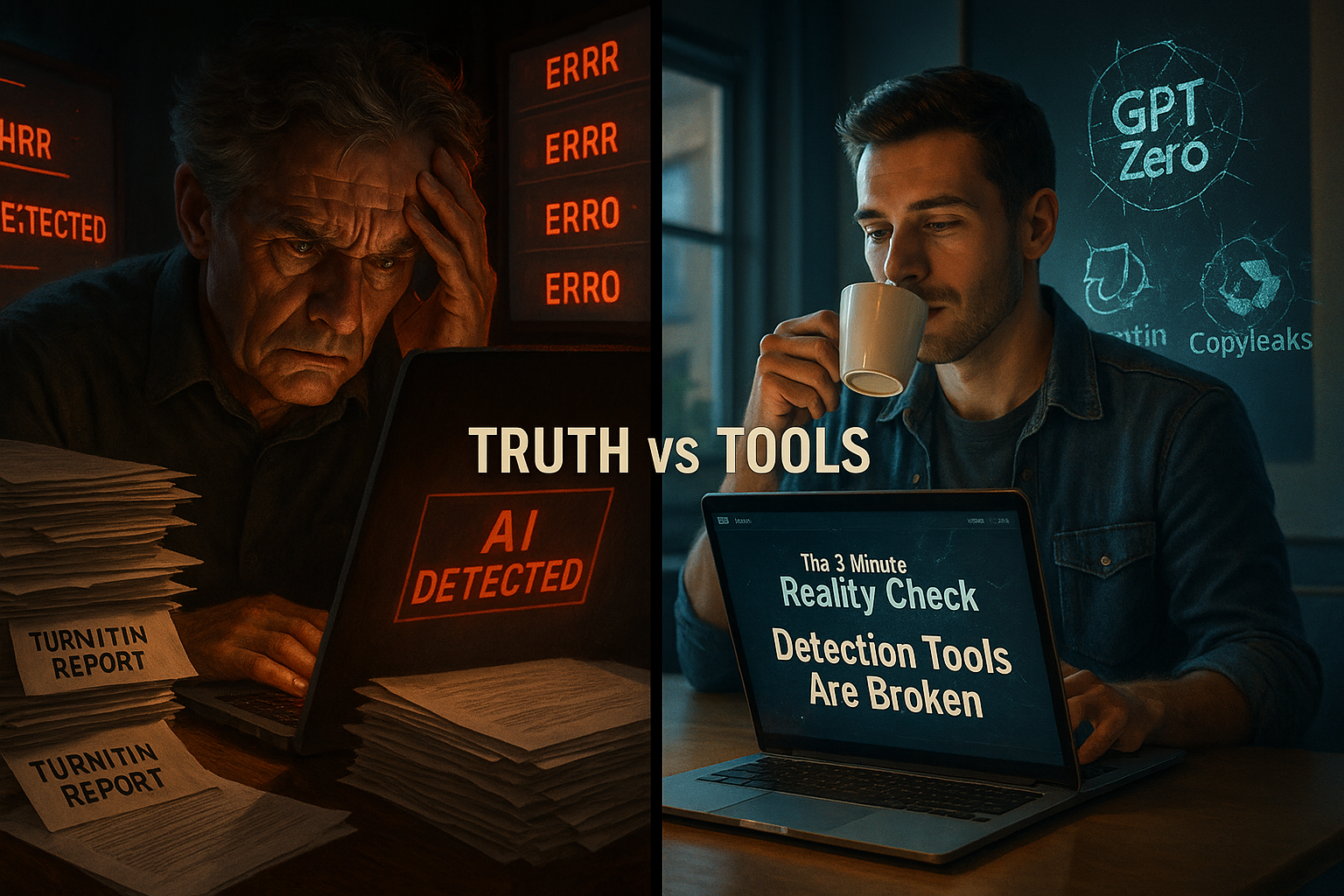
The "They'll Never Know" Method: How Detection Actually Works (And Fails)
Want to know how these AI detectors actually work? They're looking for patterns—specifically, the way AI writes versus how humans write. Think of it like this:
AI writing patterns:
- Perfect grammar (suspiciously perfect)
- Consistent sentence structure
- Lacks personal anecdotes
- Uses formal language throughout
- Predictable word choices
Human writing patterns:
- Natural inconsistencies
- Varied sentence lengths
- Personal touches and emotions
- Occasional grammar quirks
- Unique voice and style
But here's where it gets juicy: Research shows that simply translating AI text to another language and back can fool most detectors. One study found GPTZero completely failed to detect ChatGPT content that was Google-translated through other languages.
Your university's $50k detection system? Defeated by Google Translate. Let that sink in.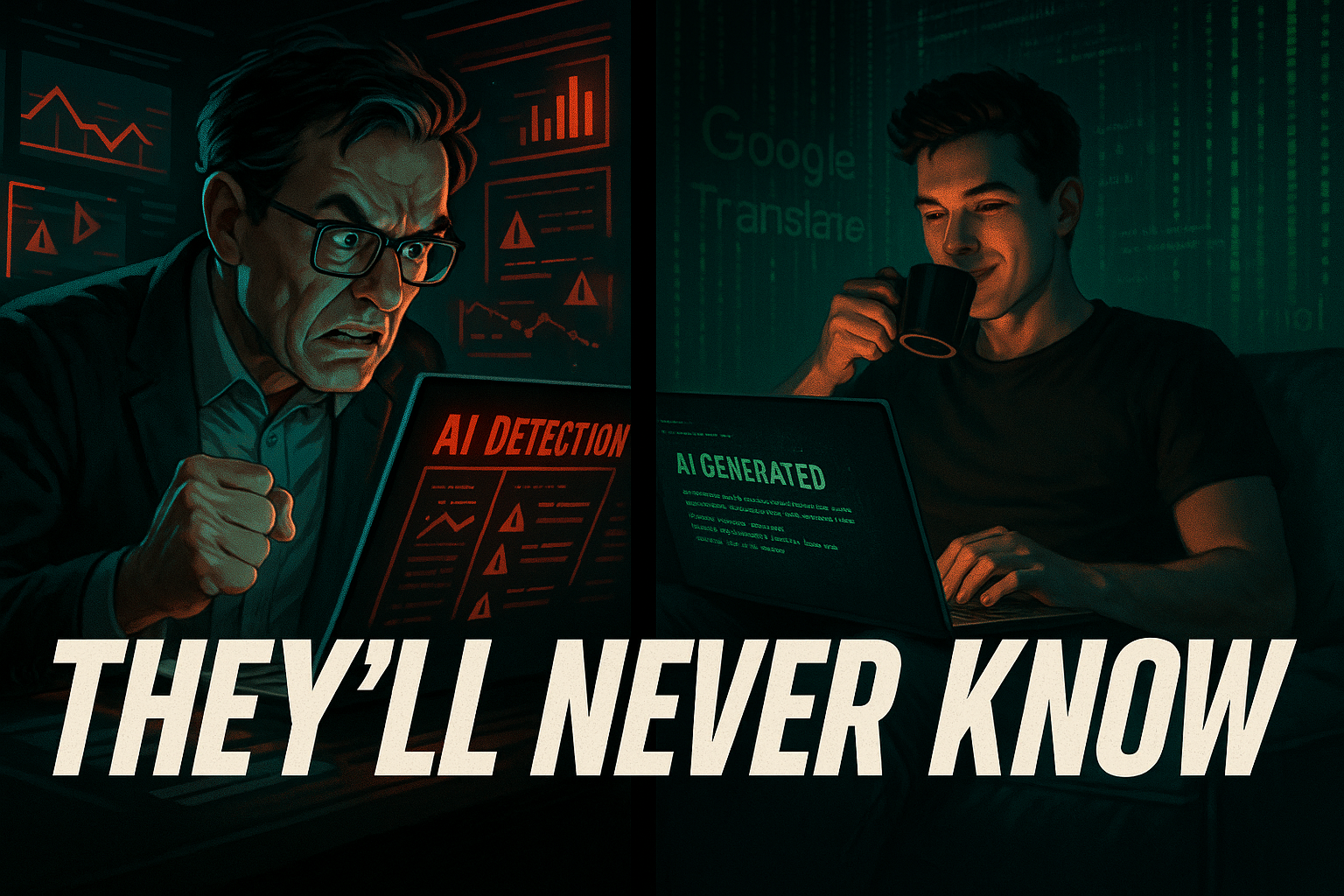
The Discrimination Loophole Nobody Talks About
Here's the scandal that should have every university lawyer sweating: AI detectors are discriminatory AF.
Stanford research revealed the shocking truth:
- 61.22% of TOEFL essays written by non-native speakers were falsely flagged as AI
- 97% of international student essays triggered at least one detector
- Black students face disproportionately higher false accusations
- Neurodiverse students get flagged more often due to their writing patterns
Translation: If English isn't your first language, or you're neurodivergent, these tools basically assume you're cheating.
Universities using AI detectors? That's a discrimination lawsuit waiting to happen.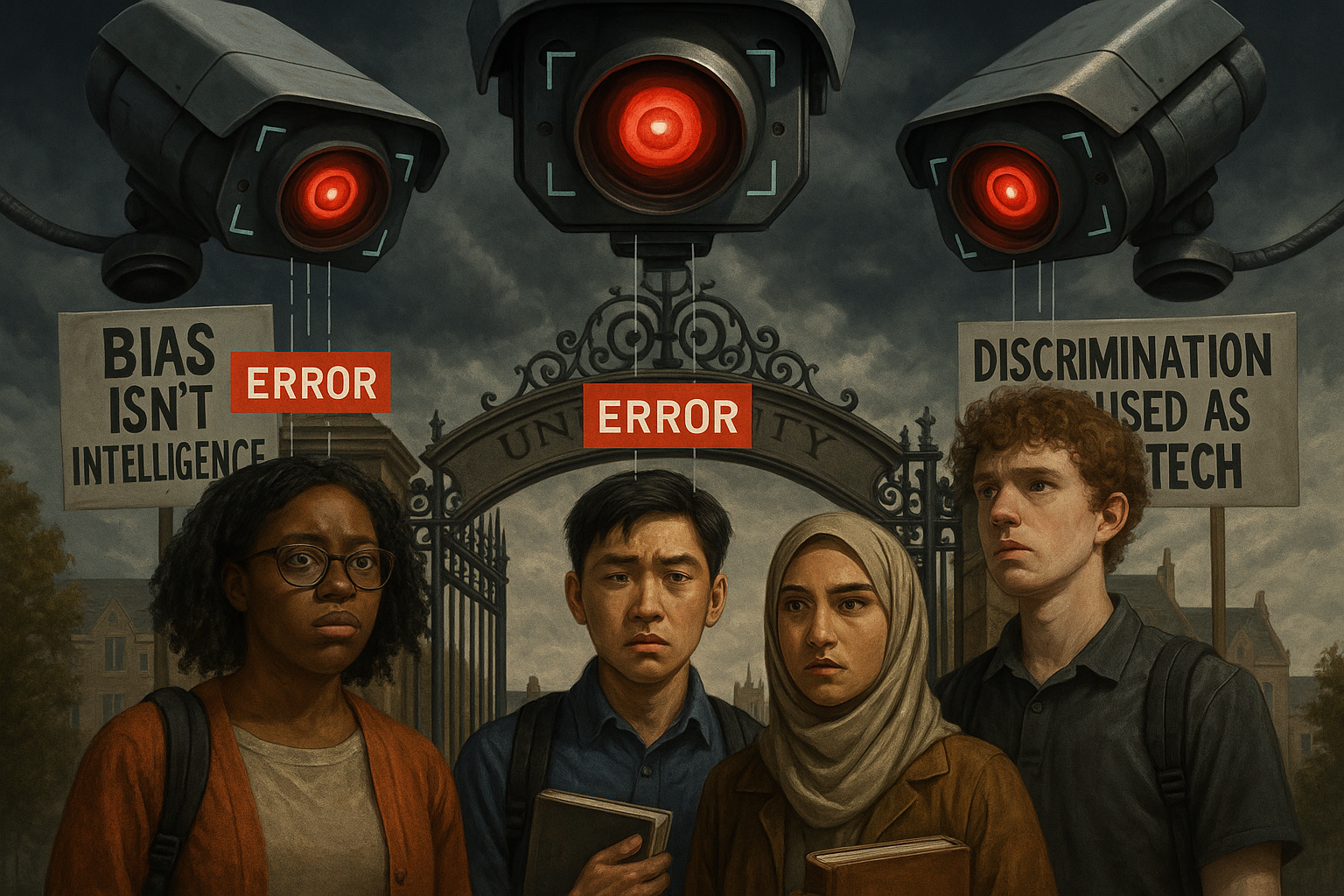
The 23-Minute Ryne Method: Smart AI Use Without the Risk
Forget spending 6 hours on an essay or risking false accusations. Here's how to use AI tools intelligently without triggering every alarm:
Step 1: The Foundation Hack (5 minutes)
- Use ChatGPT for research and outline creation
- Generate topic ideas and thesis statements
- Create a structure, not the content
Step 2: The Human Touch Protocol (15 minutes)
- Write in your own voice using the AI outline
- Add personal examples and experiences
- Include intentional imperfections (yes, really)
- Vary your sentence structure dramatically
Step 3: The Ryne Polish (3 minutes)
- Use Ryne.ai's humanizer tool to ensure natural flow
- Check for AI patterns and eliminate them
- Add field-specific jargon your prof loves
Watch this 2-minute tutorial on using Ryne's humanizer like a pro.
Turn your 6-hour essay marathon into a 23-minute sprint. Your GPA will thank you.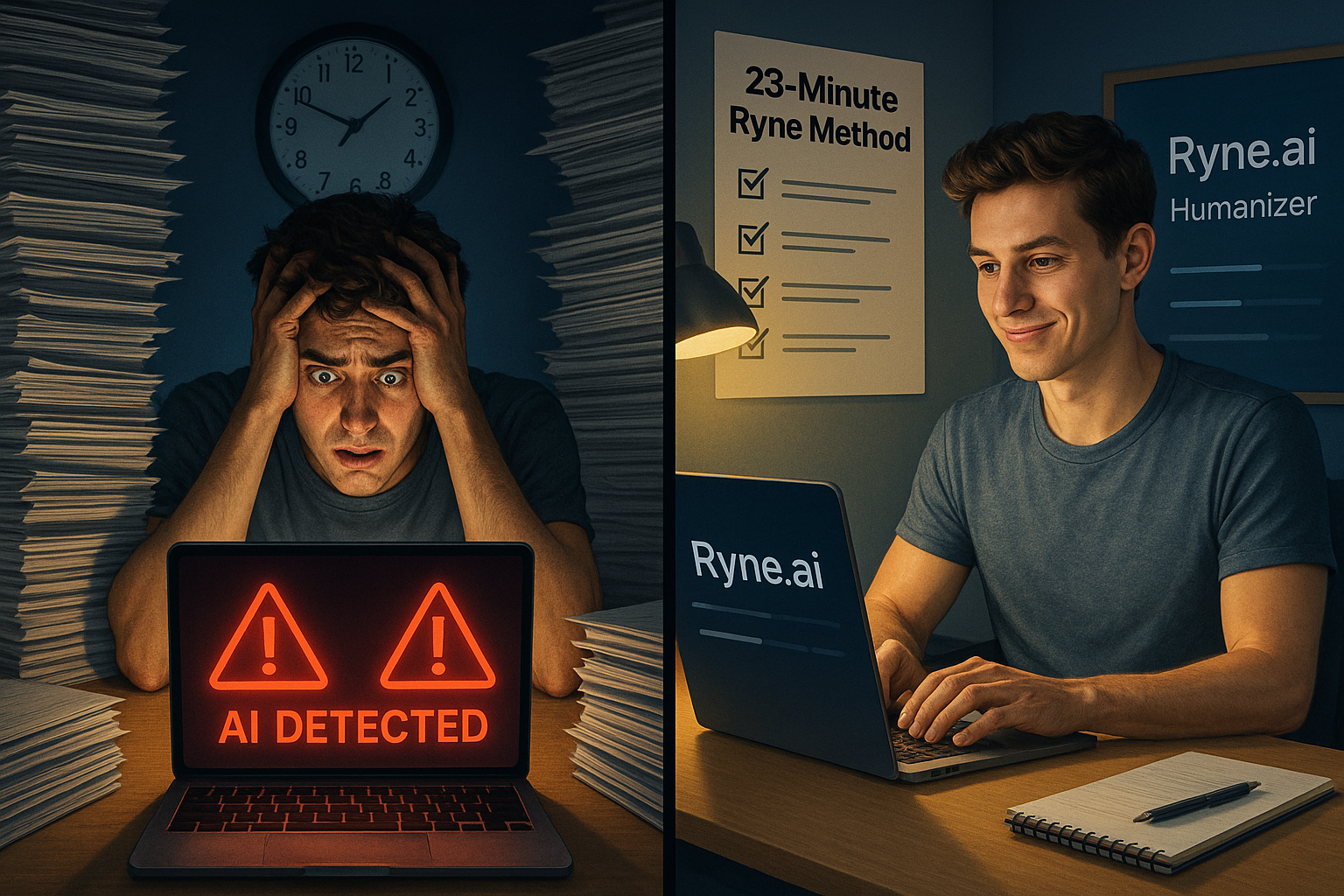
The "Get Out of Jail Free" Card: What to Do If You're Accused
False accusation? Here's your defense playbook:
- Demand specifics: Which tool flagged you? What percentage?
- Know the bias: Cite Stanford's research on discrimination
- Request human review: AI detectors aren't legally binding evidence
- Document everything: Save drafts, research notes, brainstorming sessions
- Know your rights: Many universities prohibit AI detectors as sole evidence
University of San Diego's research confirms that legal experts can fool detectors 80-90% of the time just by adding the word "cheeky" to prompts.
Accused of using AI? Your prof's detection tool is more likely to be wrong than right.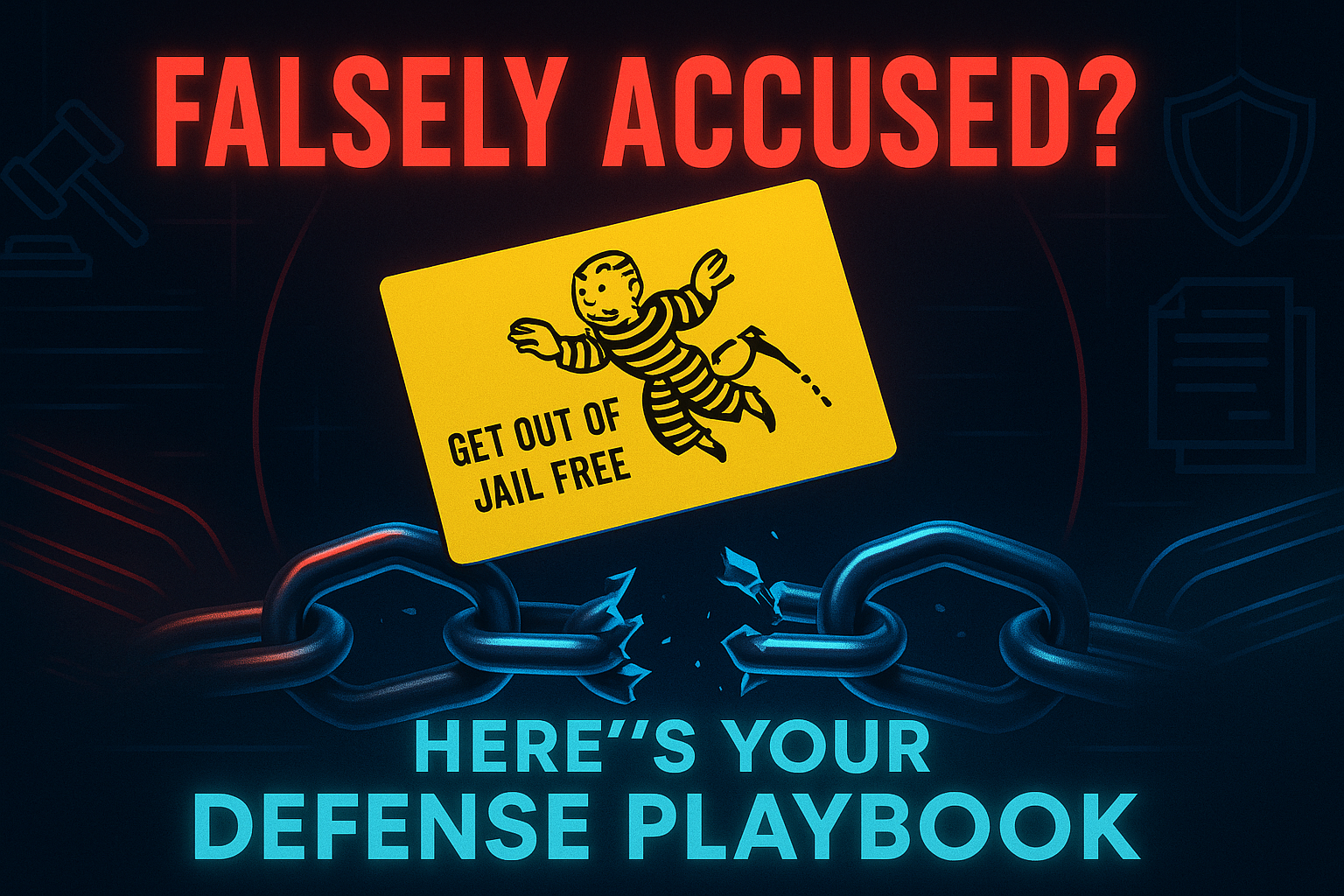
The Future-Proof Strategy: Why Fighting AI Is Like Fighting the Internet
Here's the truth bomb: Universities fighting AI is like Blockbuster fighting Netflix.
FSU's 2024 research shows that while they can sometimes detect ChatGPT use in multiple-choice exams through statistical analysis, essay detection remains a crapshoot.
The smart play? Learn to use AI as a tool, not a crutch:
- Research assistant? ✓
- Outline generator? ✓
- Grammar checker? ✓
- Essay writer? ✗
Universities banning ChatGPT is like banning calculators in 1970. Guess who won that battle?
The Bottom Line: Your 30-Second Survival Guide
Can university tell if you use ChatGPT? Sometimes, but probably not accurately.
The real questions:
- Will they falsely accuse you even if you didn't? Possibly (1-2% chance)
- Are the detection tools biased? Absolutely
- Should you use ChatGPT to write entire essays? Hell no
- Should you use AI tools smartly? Hell yes
Remember: These detection tools are so flawed that University of Pittsburgh concluded they're "not yet reliable enough to be deployed without substantial risk."
Want to use AI without the drama? Visit Ryne.ai's humanizer to transform any text into undetectable, natural writing.
Your professor spent 3 hours explaining why AI is evil. Here's the 30-second version: Use it smart, not stupid.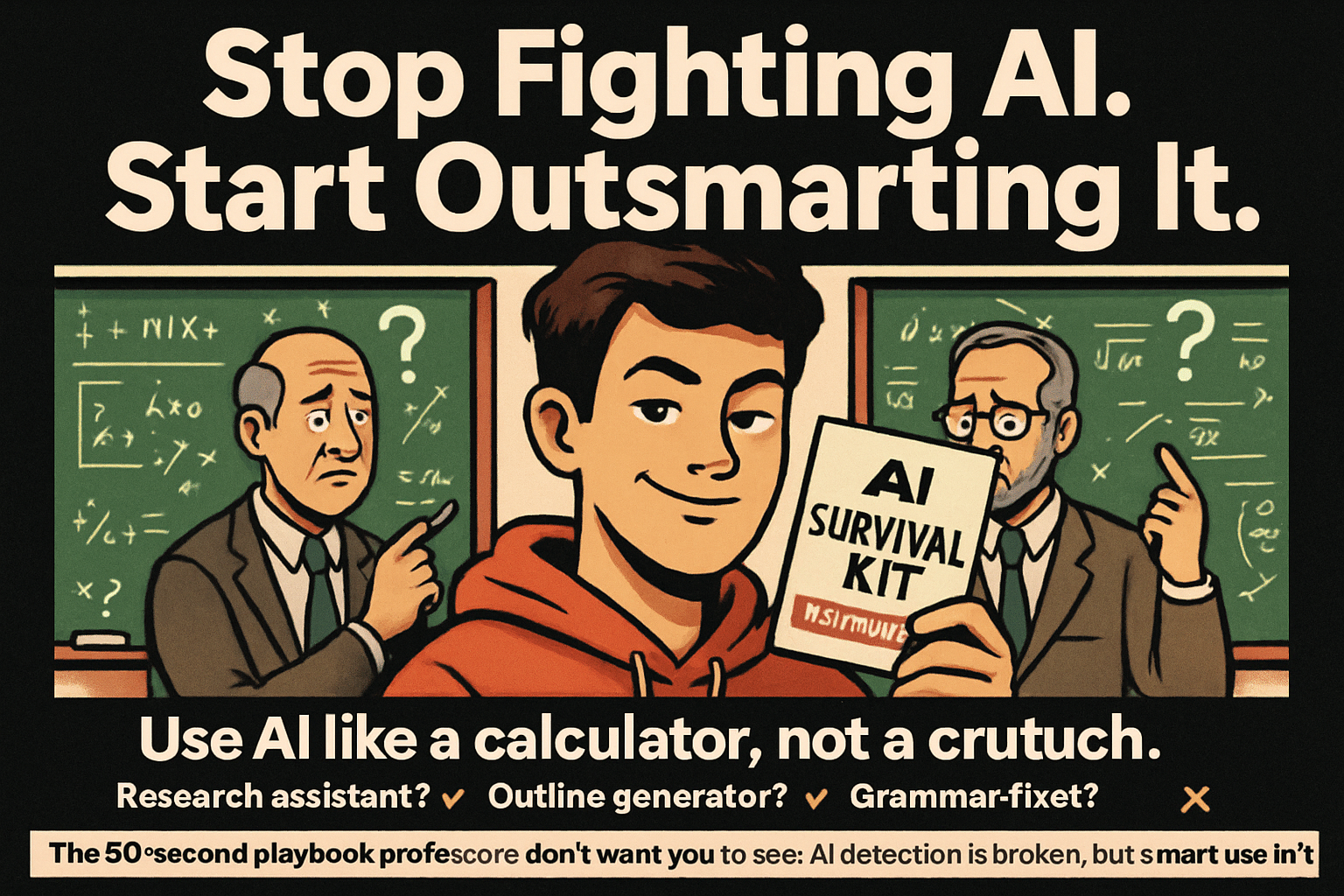
Final Reality Check: The universities spending millions on AI detection? They're using the same flawed tools that can't tell the difference between Shakespeare and ChatGPT if you know what you're doing. The future belongs to those who master AI, not those who fear it. Which side are you on?

How to 100% Humanize AI Texts?
The dirty secret your professor doesn't want you to know: AI detectors are about as accurate as a coin flip. You just spent 3 hours writing that essay, and Turnitin flagged it as 87% AI-generated. Meanwhile, your buddy copy-pasted straight from ChatGPT, ran it through a humanizer, and got a clean pass. Sound familiar? Here's the 23-minute crash course on beating the system that took researchers years to figure out.

Is Ryne AI Reliable?
Stop wasting time with AI tools that promise everything and deliver mediocrity. Here's the truth: 2.1 million students didn't accidentally stumble onto Ryne AI. They found the one platform that actually delivers what every other AI study tool pretends to offer.

